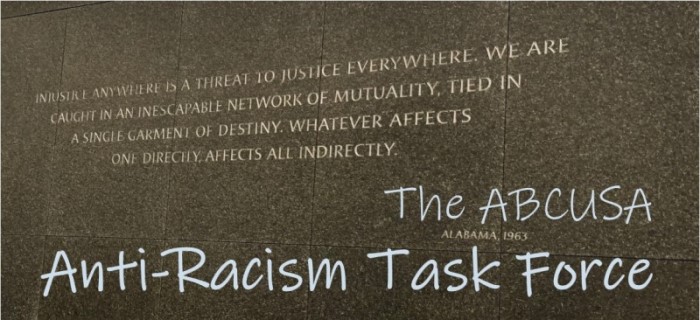The Hard Work of Being Anti-Racist
Introduction
“Behold, I am doing a new thing; now it springs forth, do you not perceive it? I will make a way in the wilderness and rivers in the desert.” Isaiah 43:19
Before I get too far in this, I need to name my context: my name is Rev. Justin Thornburgh, I serve as one of the co-chairs of the Anti-Racism Task Force, and I am a white male. I have grown up with the privilege that brings, and that’s why I’m writing this article. Recently that privilege I have worked hard to name and to be aware of rose its head. I am constantly learning and listening to those whose voices have historically been silenced in order for them to increase and me to decrease. This work is about overcoming fear and ego, and in doing so opening oneself up to the Wisdom of the Divine that works for the liberation of all of God’s beloved.
The Situation
“Racism generalizes therefore silences voices.”
The above quote was sent to me after I made a gross generalization in a communication to some members of the Anti-Racism Task Force. In this communication I said, “We are conditioned to immediately think in terms of black and white when we speak of the subject that we forget the ugly pervasiveness of racism,” and thanks be to God I was called out for this comment. Our co-chair, Rev. Dr. Natalie Wimberly, pushed back saying, “I have never thought of racism in terms of black and white nor do I ever have the option to forget the ugly pervasiveness of it! I never forget the Native American massacres and genocide, Japanese internment camps, Jewish Holocaust, colonialization, Jim Crow, etc…” This comment forced me to re-examine my initial comment to which I replied that I was making a generalization, and Dr. Wimberly replied with the quote that begins this section.
Why do I share all of this? Because these conversations are at the heart of becoming anti-racist as a person and as a denomination. I had/have a blind spot that I could not see, and it took the wisdom of my friend to reveal it to me. In reflection I see that as a preacher I have the habit of generalizing—it’s a way, I think, of removing myself from the challenges I present; however, I’m learning that in order to make my way in the wilderness, to encounter that new thing, I need to become specific. And not just specific in naming my context and the context to which I am speaking, but specific in my naming of racist actions and other actions that are antithetical to the Realm of God.
The Reflection
This is hard work. It requires being honest with myself and listening—truly listening—to my beloved friends who are speaking a truth that can be hard to hear. It takes letting go of the fear that I hold onto: fear that my ego will be hurt, that I will lose…something, fear that I’m not doing the work I claim to be doing.
The Next Steps
- Individual: Spend some time looking at correspondences, emails, Facebook posts, etc., and see where you may be/are hiding behind your fear in your writing. Ask, “Am I being specific here, or generalizing? Am I silencing any voices in my comments?” Do the hard work of reflection.
- Congregational: Look at your congregation’s website, social media presence, governing documents through the lens of specificity. Do these documents and spaces reflect a voice that is anti-racist? Do they reflect the myriad voices and perspectives within your congregation and community? Or do they reflect an era where a dominant racial group held power?
- Institutional: Similar to the congregational recommendation, honestly look at your documents. Do they reflect white supremacy or are they anti-racist? Look at your history. Reflect on how the denomination has been a beacon of light in the breaking through of the fog, but also dig into the hidden history. What is hidden in the cracks? How has the denomination silenced Black, Indigenous, and other persons of color (BIPOC), including Asian-American and Pacific Islander (AAPI) voices?” And then, setting aside fear, confess publicly these sins and affirm an anti-racist attitude.
The Anti-Racism Task Force
We would like to introduce two of our Task Force members. We will continue to feature information about members of the Anti-Racism Task Force in each subsequent publication. Today it is our pleasure to introduce Rodney Lynch and Joan Friesen.
Rev. Rodney Lynch: Serves as Pastor and Executive Director of the Baptist Student Foundation (The Found) at Purdue University, in West Lafayette, IN. Rev. Rodney is passionate about social justice (prophetic) ministry, especially around issues of racism. He believes “Racial (at-one-ment) Atonement” is possible through the lens of conciliation, truth, and storytelling and that ABCUSA has the opportunity to be the lead in this process—within our own institutions, nationally, and, perhaps someday, globally.
Rev. Joan C. Friesen: Task Force member, Chair of the Institutional Racism Sub-group of the Task Force, and Executive Minister of American Baptist Churches of Greater Indianapolis, a metro region that is diverse in every way. Joan works at having every voice be heard and honors and celebrates the many cultures that make our region and our city unique.
Rev. Dr. Dan Brockway
Rev. Abner Cotto-Bonilla
Rev. Dr. Eugene Downing
Sandra Lee
Rev. Dr. Don Ng
Rev. Justin Thornburgh
Rev. Dr. Natalie C. Wimberly
Ethan Medley
Stephanie Commandest

